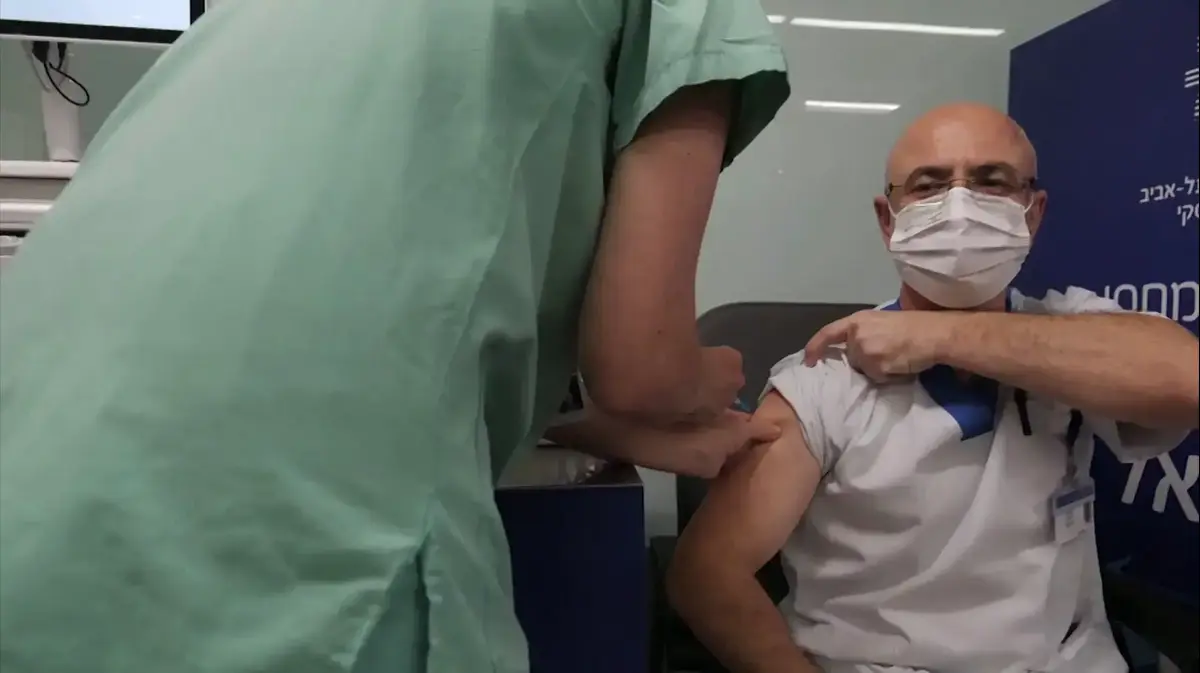Enlarge image
Test center in Obertshausen in Hesse
Photo:
Patrick Scheiber / imago images / Patrick Scheiber
This article is continuously updated.
Don't miss a thing: subscribe to our
coronavirus newsletter
for the latest developments and the most important background information
.
Aerosol researchers warn politicians against symbolic corona measures
5:20 a.m.:
Leading aerosol researchers from Germany are calling on politicians to change course in the measures to contain the coronavirus.
"If we want to get the pandemic under control, we have to make people aware that the danger is lurking INSIDE," says a letter to the federal and state governments that the dpa has received.
It is considered certain that the coronavirus spreads mainly through the air.
"Unfortunately, to this day, the essential findings of our research work have not been translated into practical action," the authors criticize.
Measures would need to be taken in homes, offices, classrooms, residential complexes and care facilities.
They warn that infection occurs indoors even if you do not meet someone directly, but an infectious person has been in a poorly ventilated room beforehand.
Debates about strolling on river promenades, staying in beer gardens, jogging or cycling, however, are counterproductive.
Second phase of easing in England with the opening of outdoor restaurants
05.05 a.m.:
In England, the second phase of the corona easing will come into force on Monday, during which the outdoor areas of pubs and restaurants will also be allowed to reopen.
In addition, all shops, gyms and hairdressers are allowed to reopen.
British Prime Minister Boris Johnson announced a week ago that the easing was "fully justified" by the falling number of infections.
With more than 127,000 corona deaths, Great Britain has the highest number of victims of the pandemic in Europe.
However, the UK is making good progress with corona vaccinations.
Of the more than 66 million inhabitants, more than 32 million received a first dose of vaccine, and a further 7.47 million people have already received both injection syringes.
As part of a four-step plan, all corona restrictions in England are to end by the end of June.
US Disease Agency CDC: 187 million vaccine doses already administered
4.40 a.m.:
According to the CDC, the United States has already given 187 million vaccinations.
As confirmed by the CDC, more than 119 million Americans have been vaccinated at least once.
In about 72 million people, the vaccinations are even completely completed.
The CDC count includes the two-dose vaccines from Moderna and Pfizer-Biontech and the single-dose vaccine from Johnson & Johnson.
City and municipality federation against nationwide curfews
03:25 a.m.:
The German Association of Towns and Municipalities considers nationwide
curfews
across Germany to be wrong, but in principle welcomes a nationwide approach to the corona pandemic.
"However, it is essential to pay attention to the development of incidence in the individual cities and districts," said the chief executive of the federal government, Gerd Landsberg, of the "Rheinische Post".
There will "certainly not be any blanket exit restrictions."
Landsberg pointed out that there are still health districts that are below an incidence of 50 new infections per 100,000 inhabitants.
The curfew as discussed in the draft for changes to the Infection Protection Act from an incidence value of 100 is constitutionally problematic.
"Such a far-reaching intervention must be limited in time and precisely justified." He added: "Here it is necessary to rely on a higher incidence value (for example 200 and higher)."
Landsberg said at the same time: "The German Association of Towns and Municipalities considers more national requirements in the Infection Protection Act to be correct."
This affects the containment of the pandemic and acceptance among the population.
Landsberg emphasized that the amendment to the Infection Protection Act is not about disempowering the states and municipalities, but rather about establishing some guard rails that should apply nationwide.
The implementation must always take into account the special conditions on site.
"Under these conditions, we consider the approaches to the planned changes to be acceptable and necessary for infection protection," he said.
The draft for a stricter Infection Protection Act provides for nationwide uniform night curfews from 9 p.m. to 5 a.m. in all districts and urban districts with a seven-day incidence of 100 or more.
Further regulations concern the closure of schools, daycare centers, shops, restaurants, universities, sports facilities and cultural institutions.
The law is to be passed by the cabinet in the coming week and then go quickly to the parliamentary process.
DGB supports compulsory corona testing in companies
02.45 a.m.:
The German Trade Union Confederation (DGB) supports a corona test obligation in companies.
DGB boss Reiner Hoffmann told the newspapers of the Funke media group that the duty envisaged by Federal Labor Minister Hubertus Heil and Vice Chancellor Olaf Scholz (both SPD) "must now come" for employers to offer their employees regular tests.
Hoffmann appealed to the CDU and CSU to give up their "blockade" on the subject.
The DGB boss warned that a self-commitment on the part of employers was not enough.
"It is simply not understandable why people in the private sector have been restricting themselves to their basic rights for over a year, but the rules for employers are still as soft as butter." The fact that employers resist mandatory requirements is not trust-building, criticized Hoffmann.
Heil wants to enforce a corona test obligation in all companies in the coming week.
He is aiming for a cabinet resolution on Tuesday.
According to a report by "Bild am Sonntag", the plans of the Federal Ministry of Labor provide that all employees who are not in the home office have the right to a corona test per week.
Anyone who has a lot of customer contact or who works with food should be entitled to two tests per week.
There should be no obligation to provide certification.
For tests with a certificate, cooperation between the companies and pharmacies that offer rapid tests should be possible.
Lauterbach: EM in twelve countries »irresponsible«
2:00 a.m.:
Health expert Karl Lauterbach believes that Uefa's adherence to a European football championship in as many as twelve countries this summer is "irresponsible".
In an interview with the Neue Osnabrücker Zeitung, the SPD politician referred to an increasing risk for football professionals of long-term consequences after corona infections.
»These are long-term health problems that can mean the immediate end of your career.
You have to honestly tell people whose health is their capital, «said Lauterbach with a view to diseases that are called Long Covid (Langes Covid-19) in technical terms.
The European Football Union (Uefa) wants to decide on April 19 whether the European Championship, which has been postponed to this year, can be played in twelve countries as planned.
Munich is planned as the German host.
The key point is the admission of viewers who have already promised eight European Championship cities.
Munich has to improve its concept on this point, according to the will of Uefa.
Chile wants to continue using Sinovac vaccine
1.30
a.m
.:
Chile continues to consider the use of the Chinese Sinovac vaccine to be sensible.
After China's director of the Center for Disease Control and Prevention announced at a conference on Saturday that the vaccine did not have very high protection rates, Chilean Science Minister Andres Couve defended the vaccine.
According to Couve, it is important to focus on the available data and the effectiveness of Sinovac.
A study by the University of Chile last week showed that the vaccine was 54 percent effective.
Chile has ordered 60 million doses of Sinovac to be administered to the country's 18 million people over a three-year period.
Linke refuses to approve changes to the Infection Protection Act
0.55 a.m.:
The planned change to the Infection Protection Act with the aim of uniform nationwide corona measures is rejected by the left.
The chairman of the left-wing parliamentary group in the Bundestag, Dietmar Bartsch, made it clear in an interview with the newspapers of the editorial network Germany (RND) that his party could not agree to the new regulations.
"It is good that there should be regulations that are understandable for everyone," said Bartsch accordingly.
“We're not going to put the brakes on the process.
In this matter, however, I have a few fundamental criticisms. "
For example, private behavior should be strictly regulated, while no obligations are provided for companies, complained Bartsch.
"That's why I hardly see any opportunities to agree to the project."
more on the subject
Infection Protection Act: Countries and parliamentary groups are scrambling for uniform corona rules
Germany's clinics are threatened with collapse: "People don't understand what the third wave means for hospitals" An interview by Katherine Rydlink
The Greens, on the other hand, agreed to cooperate on legislation despite criticism.
The parliamentary managing director of the Greens parliamentary group, Britta Haßelmann, told the RND that the draft law was "at best a makeshift solution and in urgent need of improvement."
"It must be ensured that the proposed regulations are effective, proportionate and constitutional," said Haßelmann.
Business and the world of work in particular should also be obliged to contribute more to preventing infection.
Haßelmann also said: “The infection situation and the situation in many intensive care units are worrying.
We urgently need to act. «The Greens are therefore ready to enable a speedy decision-making process.
The draft for a stricter Infection Protection Act provides nationwide uniform night curfews from 9 p.m. to midnight in all districts and urban districts with a seven-day incidence of 100 or more.
Further regulations concern the closure of schools, daycare centers, shops, restaurants, universities, sports facilities and cultural institutions.
The law is to be passed by the cabinet in the coming week and then go quickly to the parliamentary process.
cop / AFP / dpa / Reuters / AP














